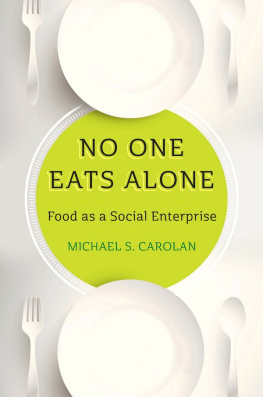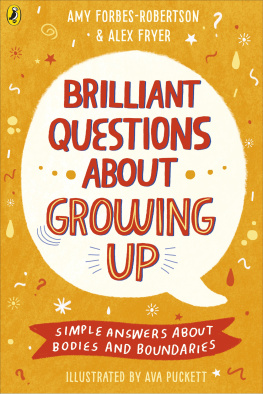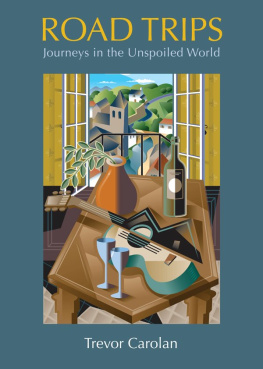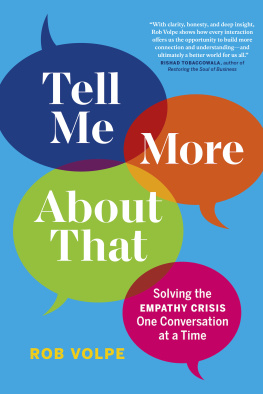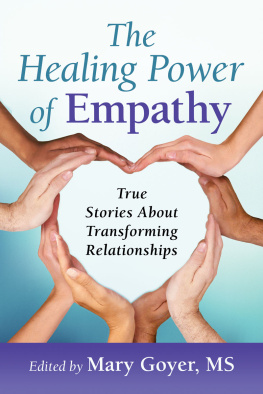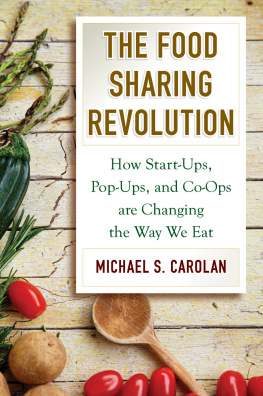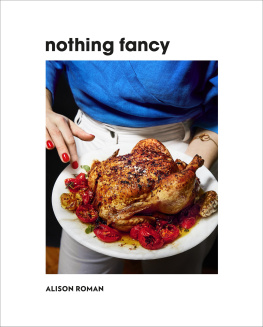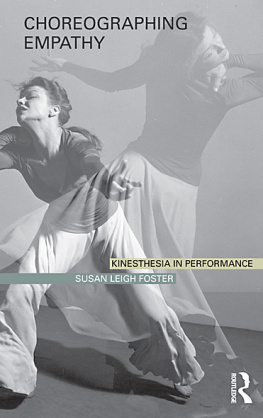A Decent Meal
BUILDING EMPATHY IN A DIVIDED AMERICA
Michael Carolan
Redwood Press
STANFORD, CALIFORNIA
STANFORD UNIVERSITY PRESS
Stanford, California
2021 by the Board of Trustees of the Leland Stanford Junior University.
All rights reserved.
No part of this book may be reproduced or transmitted in any form or by any means, electronic or mechanical, including photocopying and recording, or in any information storage or retrieval system without the prior written permission of Stanford University Press.
Printed in the United States of America on acid-free, archival-quality paper
Library of Congress Cataloging-in-Publication Data
Names: Carolan, Michael S., author.
Title: A decent meal : building empathy in a divided America / Michael Carolan.
Description: Stanford, California : Redwood Press, 2021. | Includes bibliographical references and index.
Identifiers: LCCN 2021018472 (print) | LCCN 2021018473 (ebook) | ISBN 9781503613287 (cloth) | ISBN 9781503629547 (epub)
Subjects: LCSH: EmpathySocial aspectsUnited States. | Attitude changeUnited StatesExperiments. | Social groupsUnited StatesPsychological aspects. | Right and left (Political science)United States. | Attitude (Psychology)United States. | Social psychologyUnited States. | Public opinionUnited States.
Classification: LCC BF575.E55 C357 2021 (print) | LCC BF575.E55 (ebook) | DDC 152.4/1--dc23
LC record available at https://lccn.loc.gov/2021018472
LC ebook record available at https://lccn.loc.gov/2021018473
Cover design: Michel Vrana
Cover image: iStock (composite)
Text design: Kevin Barrett Kane
Typeset at Stanford University Press in 11/15 Arno Pro
Contents
CHAPTER 1
Journeys to the Heartland
THIS BOOKS ORIGIN STORY involves strawberrieswhat Ive come to call the strawberry study. A dozen individuals were recruited from middle-class and higher economic backgrounds from northern Colorado. The stated purpose of this exploratory study was to better understand what information participants absorbed about strawberry productionfrom facts to feelingsand whether this knowledge had any effect on their attitudes about industrial strawberries and the invisible labor that supplies eaters with this delicate fruit. I was especially interested in whether these outcomes varied depending on the knowledge-delivery method. Participants were first told about the processes and people involved through handouts and a documentary about immigrant strawberry laborers. Later, they experienced it by picking. They were also asked to use their phones to take photos while in the field.
The images were the biggest surprise, lending unexpected empirical weight to the qualitative interview data. They changed substantially over the course of the day. Morning frames were remarkable in their repetitive samenesslandscape shots broken up with the occasional arms-length selfie. Yet by afternoon, with the sun hot overhead, the images told a different story. Selfies were closer, suggesting that the focal point was not the face but the exhaustion. Sweaty faces and wet, matted heads of hair. Upturned baseball caps showing sweat-drenched bills. A pair of soil-stained bare knees. A half-dozen pictures of trays held by fingers caked with dirt. By days end, everyoneeveryonehad taken photos that not only documented their physical exertion but accentuated it.
A week later, after bodies had had time to heal and minds the opportunity to reflect, I met with each participant. What I heard verified what the photos had shown me. One individual, Nick, had commented at the beginning of the study that illegal aliens are stealing our jobs. A bleeding-heart liberal is not a term that has ever been applied to Nick; certainly, he would not see himself as oneThank Christ! Im sure he would add. He affiliates with a political tribe that watches Fox News religiously, prime-time Fox specifically. Yet, by the studys end, Nicks tone toward immigrants had changed.
Asked to reflect on his time in the field picking, he said, Yeah, that probably isnt a job many Americans would want. He then took a long breath and exhaled. The air rushed between his teeth and made a whistling sound, buying him time to think, either about the actual answer or about the one he wanted to give. Maybe we do need immigrants for some things; maybe I can be too harsh. Granted, Nicks growth as an empathetic individual toward this group is far from complete; after all, immigrants are here for much more than just manual labor. But if this pivot represents the beginning of something more, then I welcome it.
What is remarkable about Nicks response is not so much the content of his words but what they represent, and what that might imply about society on a much larger scale. Nick lacked empathy for agricultural workers (especially foreign-born ones), and this experience created a space within him for it. Empathy, Ive found, starts not by changing minds but by changing our opinions of others. As for how those opinions get changed, you might be surprised by what I found.
Palms turned up and raised off the table, Nicks apologetic repose was not unique to the group; many described similar attitudinal shifts after exposure to that fieldwork. And they did this without ever meeting a single immigrant laborer. I am not saying the experiment changed their political loyalties, that it somehow changed their cognitive filters. By studys end they remained motivated partisans, just a little less so when it came to issues of immigration and immigrant labor.
I was reluctant to draw too many conclusions from this study. It was exploratory, after all. Without getting very specific, something had happened to those participants. Wanting to learn more, I set out from there.
We All Have a Duane Story
His skills as an arborist were put to work on a blustery winter day in 2017. Surrounded by peach trees and a couple dozen men from Mexico, Duane pruned as I chatted with one of the farms owners. It was mid-February. We were at a fruit orchard in western Colorado. Duane was providing research assistancehis Spanish was better than mine. We were investigating how federal immigration policies had impacted the states fruit farms, a project that included interviewing some of those workers for whom the United States is a foreign land.
Though it was early afternoon, the winter sun hung low in the horizon. The skeletal trees looked as though they were decorated with flickering lights, such was the effect when the pruners lopping shears caught the midday rays and glinted brightly. Duane looked remarkably at ease, not just with the shears but with those he was working alongside. He had teamed up with another gentleman. Standing shoulder to shoulder, the exhaust of their breath in the cold air mixed between their almost-touching baseball-cap bills. Even at 100 yards, I could make out bits of Spanish:... aqu... ;... ms bajo... ;... est bien... The cold air and gentle breeze proved an especially good conduit for their laughter. It registered as if they were standing directly in front of me.
The next day, Duane was behind the wheel, driving an underpowered four-cylinder Ford Ranger over the 7,834-foot Raton Pass on the ColoradoNew Mexico border. I was seated at the other end of the tattered bench seat. We were leaving the state to continue the research that had taken us to that western Colorado fruit farm. It was then that he shared with me some of his biography, which put into context the interaction that I just described.


